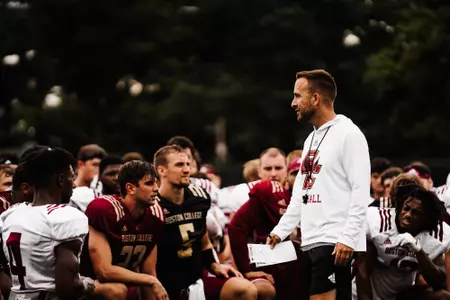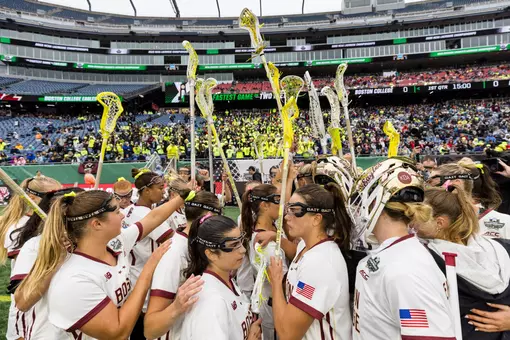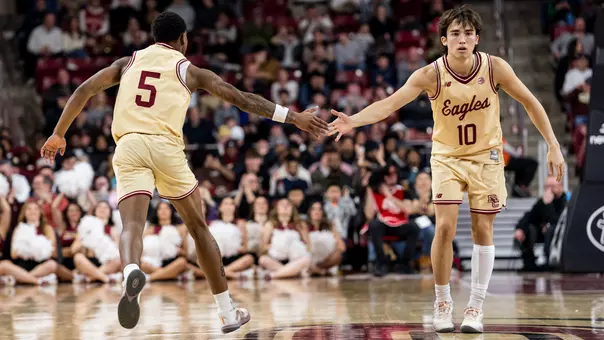Boston College Athletics

First Scrimmage Zeroes Progress Into Focus
August 15, 2022 | Football, #ForBoston Files
The litmus test is a reflection on what was, what is, and what will be.
A college football team's preseason camp is all about improvement and progress. The first days and weeks are structured for players and coaches to progressively stage their areas of growth, and the installation of a full offense or defense increases every day with its complexity. The scheme remains adaptable as players offer positives or negatives, but the nuances and schemes are forced to accelerate on a daily basis.
The sense of urgency never waivers as the days tick away. The formula is constructed carefully by coaches observing every practice on the journey, but the collaboration is still tribal by nature. Players are normally working under the direction of their position coaches or groups, and not even the greater system derails a primary objective forcing them to expand their football knowledge and capacity as the first game draws nearer.
Everything, it feels, revolves around these series of firsts - the first workout, the first snap, the first play, even the first contact. On Monday, the first scrimmage is the first time Boston College is being forced into game-like situations without that safety net.
"We'll find out a lot [on Monday]," said head coach Jeff Hafley. "The energy is great. The interaction with the coaches is great. I like what we're building. The guys in the meeting rooms are really tuned in, and I think the coaches are doing a great job. We pretty much scrimmage and play ball every day, but it'll be good to get the coaches completely off the field. We'll put [the players] through some situational stuff [to] see them think and react without any hints of [signals] or alerts. [We can] ramp up and put some pressure on them to see how they handle [it]. For some of the young guys, [it's how they] handle the anxiety of a scrimmage. I'm excited for it. I think it's time for it."
A scrimmage is an important concept compared to a standard preseason practice. The aforementioned loss of the coaches removes the players' ability to learn or fix more needy areas in real time, even if the drills or situations aren't much different than a standard practice. Running a red zone drill or a "get-off" field goal doesn't have the protective whistle pausing the scheme to realign a player or formation, which in turn generates more pressure for teammates now responsible for the on-field communication.
Stress levels are likely to increase if they aren't able to immediately meet those challenges, and the translation of those gaps is felt among everyone, including the coaches who normally identify or watch plays from field level. Their positioning from a coach's box or sideline requires them to analyze corrections within their notes, and they won't have the same luxury they possess during a given week. They'll debug what they see, but the process of singling out the grade-outs is different.
"You can grade every practice," Hafley said, "and you can see how many missed assignments [and] busts to compare to where you were last year. But at the same time, in something like defense, we're putting way more [into the scheme] than last year, and [Sunday] was practice no. 9. If you're looking at the install, compared to last year, it's close. We're okay with that because we want to push the limit on defense.
"The repeated mistakes, what I have found, you can practice as hard as you can and do everything you can," he added, "but you don't want to overthink things and paralyze [yourself] because you're afraid to make a mistake. If it's the same guy doing the same thing over and over, you worry that you're not coaching well enough because you always have to look at [yourself] first, which a lot of guys don't want to do. It's our fault first, and then maybe we figure out a way to teach them if [the play] doesn't work."
Scrimmages highlight that importance, and Monday's streamlining is a different litmus test compared to the rest of a camp where BC typically runs game-type situations on a regular basis. Hafley and his coaches are proponents of having first team offenses battle first team defenses in practice, and the "good-on-good" approach has them constantly fighting for imaginary points on every single play at practice.
From that angle, it's not particularly difficult to single out areas of improvement, but utilizing and analyzing compete levels adds more layers to scrimmaging. Removing every harness increases the intensity and shows which players are ready to move past thud-style tackles designed to protect players, but going too hard opens the door for injuries or contact classified more towards unnecessary for a team still learning its identity and system.
"We're thud tackling right now," Hafley said, "so no one's going to the ground…the hard part is there's a fine line. Do we want to go live and tackle to the ground? You don't have any preseason games [like in the NFL], right? You open up with two really good opponents, so how much live tackling do you want to do in a practice versus how much thud do you do? Can you afford to maybe get a guy injured [in full-on contact]? There's a fine line on that, but I want everybody to finish violent [in a game]."
That duality is reflected in almost every angle for Monday morning. It isn't the full measuring stick of the team's progress, but it's an important step when the unrelenting march towards September 3 doesn't slow down. The drills and periods won't change from a regular practice, but the slight variations impress different significances or imprints from a standard day in Fish Field House. It's not likely in Alumni Stadium, but the shadow of the edifice next to the practice facility looms just a little bit larger for the Eagles.
The true importance of the first scrimmage isn't felt until long after the coaches review their notes and film, but what happens against Rutgers and beyond draws its straight line to the first scrimmage, the first day in pads, the first workout and beyond. It's a marathon, but future miles won't continue without the progress made during the current kilometer.
The sense of urgency never waivers as the days tick away. The formula is constructed carefully by coaches observing every practice on the journey, but the collaboration is still tribal by nature. Players are normally working under the direction of their position coaches or groups, and not even the greater system derails a primary objective forcing them to expand their football knowledge and capacity as the first game draws nearer.
Everything, it feels, revolves around these series of firsts - the first workout, the first snap, the first play, even the first contact. On Monday, the first scrimmage is the first time Boston College is being forced into game-like situations without that safety net.
"We'll find out a lot [on Monday]," said head coach Jeff Hafley. "The energy is great. The interaction with the coaches is great. I like what we're building. The guys in the meeting rooms are really tuned in, and I think the coaches are doing a great job. We pretty much scrimmage and play ball every day, but it'll be good to get the coaches completely off the field. We'll put [the players] through some situational stuff [to] see them think and react without any hints of [signals] or alerts. [We can] ramp up and put some pressure on them to see how they handle [it]. For some of the young guys, [it's how they] handle the anxiety of a scrimmage. I'm excited for it. I think it's time for it."
A scrimmage is an important concept compared to a standard preseason practice. The aforementioned loss of the coaches removes the players' ability to learn or fix more needy areas in real time, even if the drills or situations aren't much different than a standard practice. Running a red zone drill or a "get-off" field goal doesn't have the protective whistle pausing the scheme to realign a player or formation, which in turn generates more pressure for teammates now responsible for the on-field communication.
Stress levels are likely to increase if they aren't able to immediately meet those challenges, and the translation of those gaps is felt among everyone, including the coaches who normally identify or watch plays from field level. Their positioning from a coach's box or sideline requires them to analyze corrections within their notes, and they won't have the same luxury they possess during a given week. They'll debug what they see, but the process of singling out the grade-outs is different.
"You can grade every practice," Hafley said, "and you can see how many missed assignments [and] busts to compare to where you were last year. But at the same time, in something like defense, we're putting way more [into the scheme] than last year, and [Sunday] was practice no. 9. If you're looking at the install, compared to last year, it's close. We're okay with that because we want to push the limit on defense.
"The repeated mistakes, what I have found, you can practice as hard as you can and do everything you can," he added, "but you don't want to overthink things and paralyze [yourself] because you're afraid to make a mistake. If it's the same guy doing the same thing over and over, you worry that you're not coaching well enough because you always have to look at [yourself] first, which a lot of guys don't want to do. It's our fault first, and then maybe we figure out a way to teach them if [the play] doesn't work."
Scrimmages highlight that importance, and Monday's streamlining is a different litmus test compared to the rest of a camp where BC typically runs game-type situations on a regular basis. Hafley and his coaches are proponents of having first team offenses battle first team defenses in practice, and the "good-on-good" approach has them constantly fighting for imaginary points on every single play at practice.
From that angle, it's not particularly difficult to single out areas of improvement, but utilizing and analyzing compete levels adds more layers to scrimmaging. Removing every harness increases the intensity and shows which players are ready to move past thud-style tackles designed to protect players, but going too hard opens the door for injuries or contact classified more towards unnecessary for a team still learning its identity and system.
"We're thud tackling right now," Hafley said, "so no one's going to the ground…the hard part is there's a fine line. Do we want to go live and tackle to the ground? You don't have any preseason games [like in the NFL], right? You open up with two really good opponents, so how much live tackling do you want to do in a practice versus how much thud do you do? Can you afford to maybe get a guy injured [in full-on contact]? There's a fine line on that, but I want everybody to finish violent [in a game]."
That duality is reflected in almost every angle for Monday morning. It isn't the full measuring stick of the team's progress, but it's an important step when the unrelenting march towards September 3 doesn't slow down. The drills and periods won't change from a regular practice, but the slight variations impress different significances or imprints from a standard day in Fish Field House. It's not likely in Alumni Stadium, but the shadow of the edifice next to the practice facility looms just a little bit larger for the Eagles.
The true importance of the first scrimmage isn't felt until long after the coaches review their notes and film, but what happens against Rutgers and beyond draws its straight line to the first scrimmage, the first day in pads, the first workout and beyond. It's a marathon, but future miles won't continue without the progress made during the current kilometer.
Men's Hockey: UConn Press Conference (Feb. 20, 2026)
Saturday, February 21
Women's Basketball: SMU Postgame Press Conference (Feb. 19, 2026)
Friday, February 20
Men's Basketball: Florida State Postgame Press Conference (Feb. 17, 2026)
Thursday, February 19
The Podcast For Boston Baseball Edition
Wednesday, February 18


















